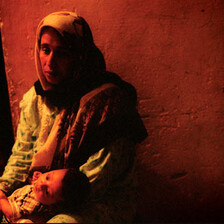East Jerusalem, Palestine 20 April 2002
On Wednesday I left the wasteland of Gaza and came to East Jerusalem where it is easier to base oneself for traveling. For two days I stayed in the Jenin refugee camp, returning only late this evening. I know I will have to write about it soon in much greater detail than here, even though I know many people are doing this. The sorry truth is that it will not be nearly enough.
What I saw in the former Jenin refugee camp was the most horrible thing I have ever seen in my life. I will never be able to forget the people whose stories I listened to, or the sounds and smells that accompanied a kind of destruction I didn’t know was possible: I now know the smell of death and what it is like to realize that you are standing on top of rubble under which people lie buried, unrecognizable and in many cases unreachable. I now know what tank shells, ammunition rounds, and missiles look like after they’ve exploded in peoples’ bedrooms, family rooms, and kitchens. I heard a loud explosion just after the first long, endlessly awful day in the camp, and saw a pitiful shack on the perimeter of the camp go up in flames—the family had left because a missile fired from an Apache helicopter had failed to detonate when it first came through the roof.
At the remnants of the refugee hospital inside the camp I watched as teams of workers with masks over their mouths and noses dug up bodies that had been buried in makeshift graves because they were not allowed to be taken out for proper burial during the seige. More bodies were brought in and laid out on the ground in white sheets and then loaded into trucks— bodies of people (men, women, and children) who died when their houses collapsed on them or who were executed while tied up, or run over by tanks in the streets as a “message” to the other inhabitants of the camp. I saw men and women sobbing in the arms of their families and friends after identifying yet another son, brother, father, or friend decomposing under the plastic and the sheets and the disinfectants now being desperately sprayed to cover up the stench.
Bulldozers plowed through the flattened ruins of an entire camp unearthing blankets, clothes, shoes, toys, books, schoolbags, mattresses, smashed furniture, spoons, forks, dishes, unrecognizable fragments of once intact homes. A woman wandering amid the ruins told me she had no idea where her house was; Another begged me to tell people to just give them bread and water so they could live—that’s all they needed, she said. Bread and water. Please help.
At the Shifa Surgical Hospital just outside Jenin city, I asked if they were short of blood, oxygen, and other medical supplies. The head doctor there said no—they had plenty. Why? Because the ambulances and emergency medical teams sent from there to get the dead and wounded inside Jenin camp were not allowed inside—for twelve days.
13,000 people lived in the Jenin refugee camp. There are 3,000 people there now. Most fled to villages outside the camp and have nothing left to return to. This morning Israeli tanks fired rounds at people trying to return to their “homes” to see if there was anything left in the rubble of their former lives.
They are not being allowed back. Hundreds of people are unaccounted for and more than one thousand have been arrested and taken to prison. Doctors, UN workers, human rights workers (such as from Medecins sans Frontieres and (Save the Children) estimate that the Israeli assualt on the Jenin camp killed between three and six hundred people.
Don’t believe what CNN and BBC, among other western news agencies, are telling you. Ask why there can be no investigation; why it must be called a “humanitarian tragedy” rather than the war crime that it is; ask why the EU has not imposed sanctions on Israel for its actions; ask why no international monitoring force is immediately leaving for the region; ask why Israeli political and military spokespeople are telling reporters that “only (sic) 45 people died” and that they were all armed “militants”. Ask why few are willing to challenge these comments or remind these spokespeople that Israel conducted a massive military offensive against people who have the right to resist the occupation of their land.
If your blood doesn’t run cold when US President George W. Bush calls Ariel Sharon a “man of peace” that is probably because you have bought the lies packaged as news by a massive pro-Israeli propaganda machine. Americans, you are paying for the dehumanization and destruction of an entire people. Jenin is only the most ominous and recent reminder of where Israel’s 54 year old policies against the Palestinians are leading.

